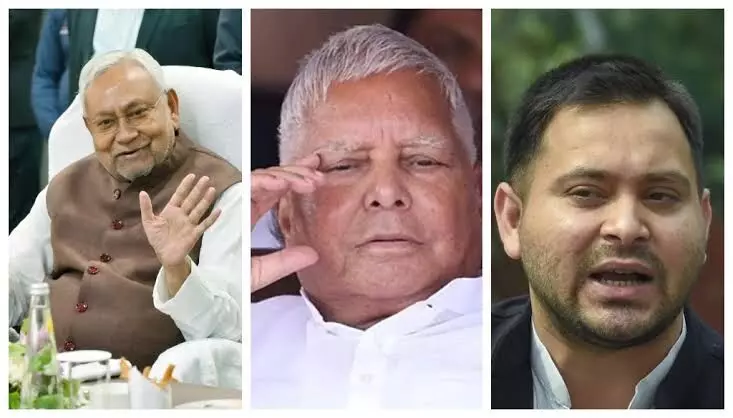Gambling with Jungle Raj: Is Bihar Slipping Back?

Amid rising violence and political blame games in Bihar, the state’s famed administrative legacy faces erosion. As high-profile murders mount, critics question whether governance has collapsed—and if Jungle Raj has returned, not by memory, but mismanagement.
In Bihar, a state long known for its complex political tapestry and administrative resilience, the recent surge in violent crimes has cast a troubling shadow over its governance narrative. The murder of businessman Vikram Jha in Patna’s Ramkrishna Nagar on July 11, following the killings of sand mining entrepreneur Rajesh Singh on July 10 and industrialist Gopal Khemka on July 4, marks the third high-profile assassination in just ten days. These incidents have ignited a political firestorm, with opposition leader Tejashwi Yadav accusing Chief Minister Nitish Kumar of silence and inaction, and branding the ruling coalition as the “corrupt Bhoonja Party.” The timing of these crimes—mere months before the Bihar Assembly elections—raises urgent questions about the state’s law and order machinery, its political accountability, and the erosion of public trust.
Nitish Kumar, once hailed for transforming Bihar’s governance and curbing the infamous “Jungle Raj” of the 1990s, now finds himself at the center of a storm. His administration’s response to the recent killings has been reactive at best. While the Chief Minister convened a review meeting and ordered the formation of a Special Investigation Team (SIT) to probe Khemka’s murder, critics argue that these steps are too little, too late. The SIT’s search of Beur Jail and seizure of mobile phones and SIM cards may demonstrate procedural diligence, but they do not address the deeper malaise: a breakdown in deterrence, intelligence, and proactive policing.
According to the India Justice Report 2025, Bihar ranks 13th among 18 large and mid-sized states in overall police performance, with a constable vacancy rate of over 30% and a training budget utilization of just 45%. These figures suggest systemic underinvestment in law enforcement, which directly impacts crime prevention and public safety.
The National Crime Records Bureau (NCRB) data further complicates the picture. Bihar’s crime rate in 2025 stands at 228 incidents per 100,000 people, up from 211 in 2020. While this is lower than states like Kerala or Delhi, the nature of crimes—targeted killings, extortion, and mafia-linked violence—points to a qualitative deterioration. RJD leaders claim that over 65,000 murders have occurred during Nitish Kumar’s tenure, a figure that, if accurate, underscores a chronic failure in maintaining law and order. The conviction rate in Bihar hovers around 29%, well below the national average of 57%, indicating that even when crimes are registered, justice is often delayed or denied.
The political implications are profound. Tejashwi Yadav’s criticism is not merely rhetorical; it taps into a growing public sentiment that the state is slipping back into lawlessness. His reference to the “DK Tax transfer industry” hints at alleged corruption in administrative postings, which, if true, compromises the integrity of governance. The opposition’s framing of the current regime as a return to “Jungleraaj” is a strategic inversion of the BJP-JDU’s own narrative from previous elections. Meanwhile, NDA leaders have countered by accusing the RJD of links to sand, land, and liquor mafias, suggesting that the opposition is attempting to destabilize the state ahead of elections. This mutual recrimination, however, does little to reassure citizens who are witnessing a spike in violent crimes and a palpable decline in public safety.
Even within the NDA, cracks are beginning to show. Union Minister Chirag Paswan, an ally of Nitish Kumar, has publicly expressed concern over the deteriorating law and order situation. His remarks that “if such incidents happen in posh areas of Patna, imagine the state of villages” reflect a growing unease within the ruling coalition. Paswan’s push for a domicile policy and his announcement to contest all 243 assembly seats signal a bid to distance himself from the JDU-BJP narrative and capitalize on public discontent. His “Bihar First, Bihari First” campaign, once seen as a fringe slogan, now resonates with voters disillusioned by rising crime and administrative inertia.
The economic consequences of this law and order crisis are equally alarming. Business communities, already reeling from post-pandemic disruptions, now face threats to life and property. The murder of Gopal Khemka, whose son was also killed in 2018, has sent shockwaves through Patna’s industrial circles.
Traders and entrepreneurs report increased extortion demands and fear of targeted violence. This climate of insecurity deters investment, stifles growth, and undermines Bihar’s aspirations for economic revival. According to the Bihar Economic Survey 2024, the state’s GDP growth rate has slowed to 6.2%, down from 9.8% in 2021, partly due to declining investor confidence and poor infrastructure.
In this context, the silence of Nitish Kumar is not just political—it is existential. A leader once celebrated for administrative acumen must now confront the reality that his governance model is faltering. The absence of a coherent law and order strategy, coupled with rising crime and political infighting, threatens to derail the NDA’s electoral prospects. The electorate is watching, and the question is no longer whether Bihar is safe, but whether its leadership is capable of restoring safety. As the state heads into elections, the stakes are not just political—they are moral, economic, and deeply personal for every citizen who fears that justice may no longer be a guarantee, but a gamble.
